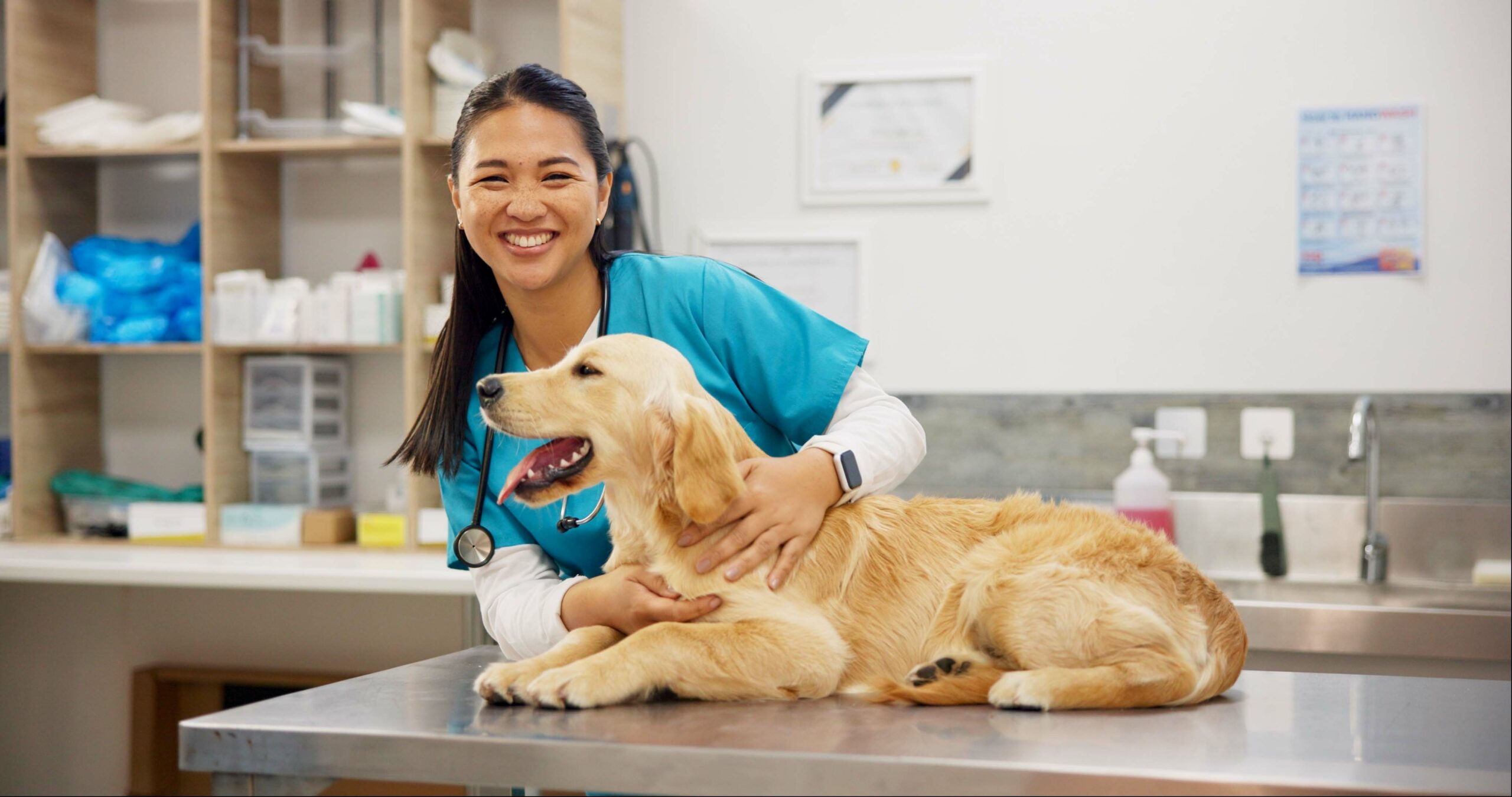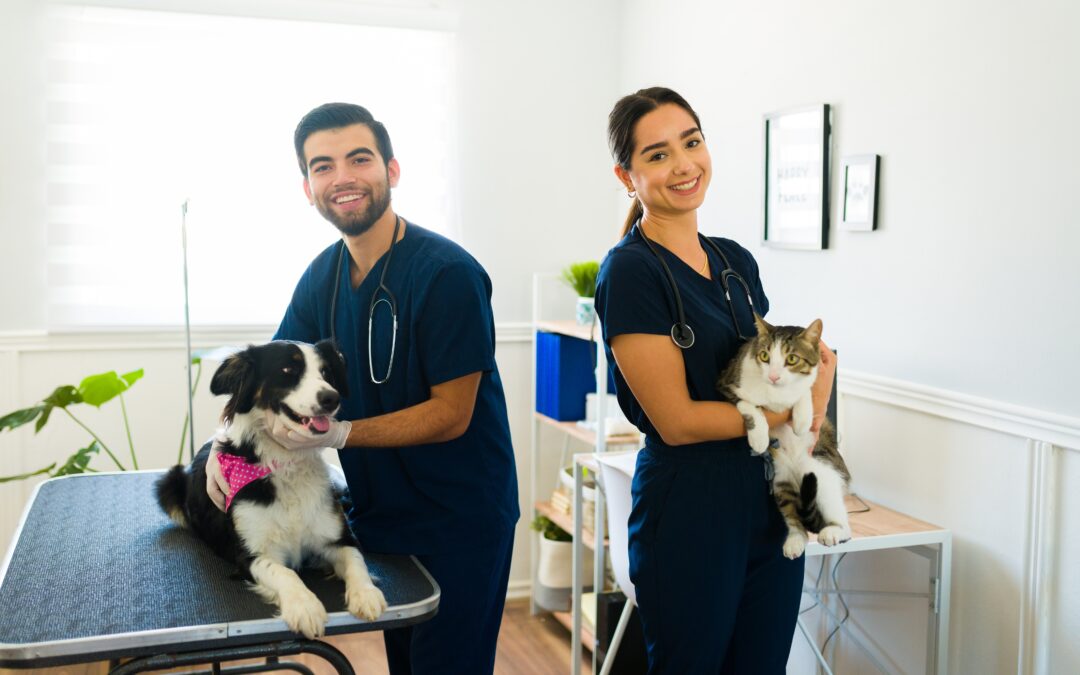Is it better to start with a privately-owned practice where you can grow your skills and gain confidence in a smaller setting? Do corporate positions really offer a better quality of life?
With so many veterinary professionals firmly pro-private or pro-corporate, it can be difficult to find a balanced perspective. At Ready, Vet, Go, we know the best early career decisions come from open-minded curiosity, thoughtful research, and a clear understanding of your personal goals and circumstances. In this post, we’ll take a look at both sides of the corporate versus practice conversation so that you can move from confusion to confidence.
Unpacking private practice: The good, the bad, and the busy
Privately-owned practices range from small one-doc standalones to multi-doctor, multi-location operations. But despite their diversity in size, most share a key trait: ownership and decision-making rest with a small group, or even a single veterinarian. This leads to a consistent set of advantages and challenges across the private practice landscape.
Advantages of private practice
- Personalized mentorship — In a smaller practice, new associates have reliable access to their mentors, resulting in a more tailored experience. Whether the practice offers a structured program or an informal one, proximity can help foster deeper learning.
- Closer client and team relationships — Private practices are often embedded in the fabric of their communities, while others are steeped in tradition. These qualities, along with a smaller, often long-tenured staff, help practices feel more collegial, homey, and supportive.
- Clinical autonomy — While you’ll still need to earn trust and demonstrate your skills, private practices generally offer greater clinical freedom. This can be a great confidence builder for early career veterinarians and help you develop your personal style of medicine.
- Flexibility and adaptability — Because they don’t have to answer to a higher authority, private practices may be more flexible about scheduling and work arrangements, as well as embracing new ideas, approving purchases, or implementing new protocols.
- Potential for practice ownership — If ownership is your ultimate goal, working in a privately owned hospital can help provide a clear path by providing firsthand experience with the business side of practice. This may create future opportunities for ownership later on.
Disadvantages of private practice
- Variable support system — Since private practices lack the structure of a corporate group, new veterinarians may find themselves with less support than they expected—or were promised. This is especially true in small practices where veterinarian-owners may not have time to provide one-on-one guidance.
- Benefits may vary — Private practices may have a limited budget for a new grad’s starting salary and benefits package. Determine what you need before you reach the contract stage to avoid compromising on what’s important.
- Mentorship isn’t guaranteed — Private practices may not be able to sacrifice the time and effort required for true mentorship. In some situations, you may be expected to hit the ground running and learn on the fly.

Corporate practice: Structure, support, and strings attached?
Like private practice, the landscape of corporate veterinary groups can vary widely, ranging from a handful of locations to hundreds. For many new veterinarians, the structure, support, and extensive resources that come with corporate practice make it an attractive and practical choice.
The upside: Advantages of corporate practice
- Structured onboarding and mentorship — If there’s one thing most corporations excel at, it’s uniformity. In some groups, corporate hires may be supported through a structured onboarding and mentorship process to ensure their understanding of practice protocols and standards.
- Robust benefits — There’s no argument—because of their size, corporate groups usually boast some of the best benefits available to veterinarians. If you’re seeking student loan assistance and comprehensive health and wellness benefits, along with generous PTO, retirement plans, CE stipends, and more, corporate practice is worth your consideration.
- Sign-on bonuses* — Groups may offer impressive financial incentives for joining their teams, but these perks have strings attached that you need to be aware of. *See disadvantages below.
- Career growth opportunities — Corporate groups are often eager to invest in their own and willing to equip veterinarians with education, leadership roles, and specialty training.
- Relocation options — Whether you’re craving a change of scenery or navigating a partner’s job moves, corporate groups often make relocation easier. With locations across the U.S. and sometimes beyond, they can help you find a new role within their network and provide support during your transition.
The strings: Disadvantages to corporate practice
- Less clinical autonomy — You knew this one was coming. Practicing in a corporate setting often involves working within a standardized protocol or policy, even when you’d prefer a different approach.
- Production pressure — Production goals are part of any practice, but new grads may find the expected numbers at corporate clinics overwhelming. This relentless pressure can affect your confidence and slow your learning pace.
- Repayment of bonuses — If you need to break your contract, you might be required to repay some or all of your sign-on incentives. This can leave veterinarians feeling stuck in roles that no longer match their goals, needs, or values.
- Feeling less connected — In corporate settings, veterinarians may sometimes feel like a number, instead of a valued and knowledgeable team member. With upper management often off-site—or even out of the country—it can be challenging to feel truly seen, heard, or personally supported in your role.
- Less flexibility — When decisions are driven by corporate policy, there is generally less room for customization. This applies to everything from work schedules and treatment plans to pricing and ordering.
Pro: The decision is YOURS
In practice, as in life, everyone is looking for something different. Whether you need a role that provides stability for your growing family, unburdens you of your student loan debt, or empowers you to chase goals and dreams you never imagined, the choice is yours.
And you can choose again. You can change. You can try both. You can bypass them all and take another path.
So don’t sweat the first step too much.
Whatever you decide, start by weighing the options against your existing needs and goals, rather than someone else’s experience or bias. Only then will you find your perfect fit!
Ready for more practical early career advice? Ready, Vet, Go Veterinary Mentorship is an innovative online program and community that helps new and early career veterinarians build confidence, gain independence, and experience greater joy. Visit our FAQ page to learn more about what we offer or get in touch with our team.

